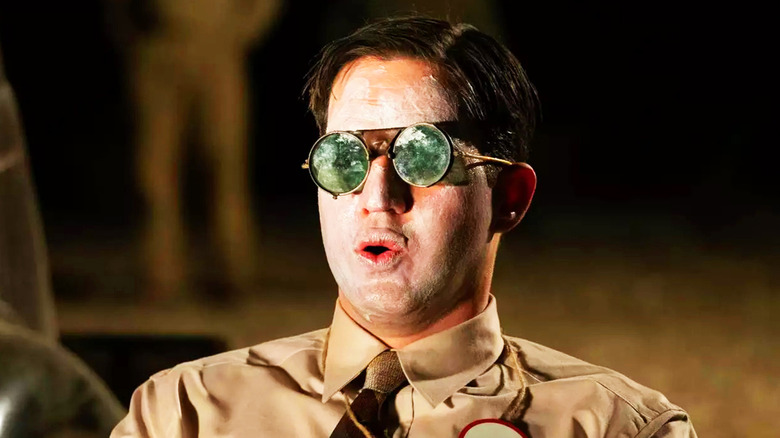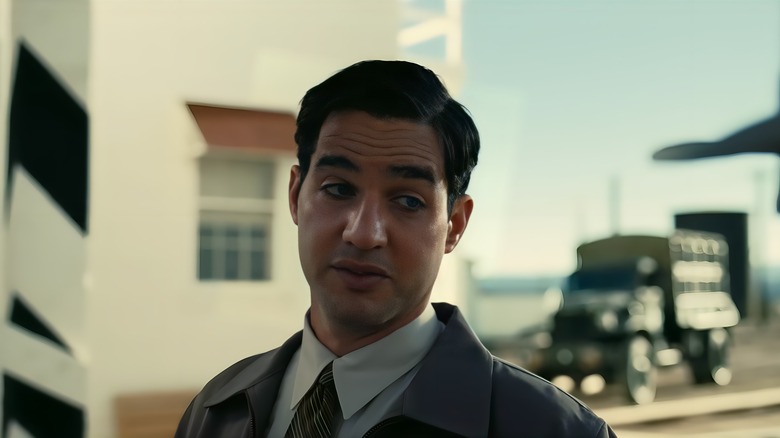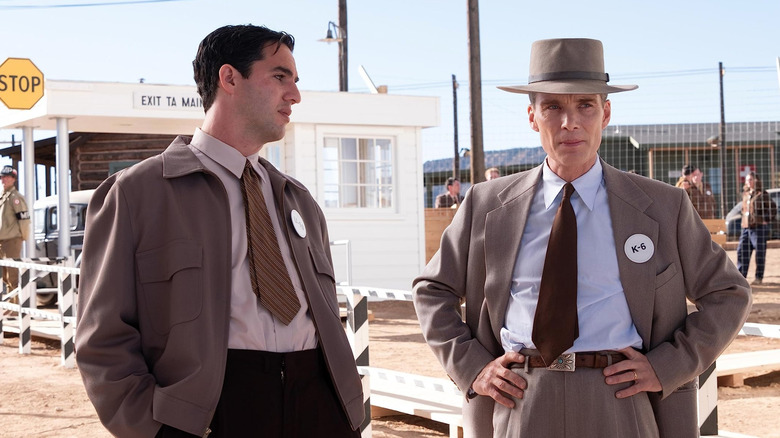Oppenheimer's Science Jargon Was A Cinch For Almost-Physicist Benny Safdie
Once the "Oppenheimer" hype dies down, you'll likely hear more of that nagging criticism of the movie being about men talking in offices and classrooms. There's no doubt large chunks of the film's three-hour runtime focus on Cillian Murphy's J. Robert Oppenheimer conversing with political leaders and his colleagues as they work their way towards creating the atom bomb. But by his own admission, Christopher Nolan's approach to filmmaking almost necessitates this kind of verbosity. As the filmmaker previously told BAFTA:
"I chose to take the path of incorporating that desire for a layered approach into the narrative itself, into the story. And so I've made films that have some ambiguity to them, or some layering to them narratively, so that if you see them a second time you're going to watch them a slightly different way. And that was my approach. There are other filmmakers who approached it from a purely visual point of view where they would just create very dense visuals that would sustain multiple viewings."
With the brilliant, horrifying biopic that is "Oppenheimer," Nolan has once again delivered his trademark layered narrative, this time in the form of an adaptation of Kai Bird and Martin J. Sherwin's Oppenheimer biography "American Prometheus." The inclusion of quantum physics as a central element of the titular scientist's story adds to that dense layering, which, for star Cillian Murphy, who was already under extreme amounts of pressure in his first lead role for Nolan, posed a further challenge. His answer was to not even try to understand physics for "Oppenheimer." Co-star Benny Safdie, however, found himself quite at home in the role of Hungarian American physicist Edward Teller, who was part of Oppenheimer's team that developed the first atom bomb at Los Alamos.
Physics and Oppenheimer
"Oppenheimer" might just be the most Christopher Nolan movie ever made, combining as it does so much of the director's previous trademarks and go-to plot devices. Nolan is often criticized for relying too much on exposition — an unfortunate by-product of his aforementioned approach to layered narratives in filmmaking. But he could hardly avoid it with "Oppenheimer," which tells the story of a man basically trying to elucidate the fundamental building blocks of existence and the strange quantum world that lurks just beyond our perception. In a way, that's sort of the most foundational form of exposition imaginable — expositing the very world we live in.
Constructing this layered narrative with such a complex subject at its heart was no doubt helped by the fact that Nolan has maintained an interest in physics throughout his career, continuing a working partnership with theoretical physicist Kip Thorne since 2014's "Interstellar." Thorne also lent his expertise to "Oppenheimer," but he and Nolan weren't the only ones with a genuine love for physics.
Benny Safdie has quietly been building an impressive acting career in recent years, playing closeted councilman Joel Wachs in Paul Thomas Anderson's 2001 effort "Licorice Pizza" alongside roles in "Stars at Noon," "Obi-Wan Kenobi," and "Are You There God? It's Me, Margaret." Having previously directed some of the most intensely memorable indie films of recent years alongside his brother Josh — the tense saga that was "Uncut Gems" being the most recent — Safdie can now add a role in a Nolan blockbuster to his résumé. As Edward Teller, the 37-year-old not only enjoyed some significant screen time opposite Cillian Murphy, he also got to indulge his love for physics, which it turns out almost dictated Safdie's career as a younger man.
'Trying to understand what this thing is'
Speaking to the Observer in 2019, Benny Safdie recounted how he only studied film at Boston University because of his brother, Josh. He recalled:
"I was going to be a physicist so I was going to school [somewhere else] for that. Josh knew I was not totally convinced and there was a film class [at BU] and he said, 'Come up here and watch these insane movies.' I did, and the teacher was incredible, and I was like, 'Oh my god, you can learn stuff like this?!' It was amazing. So I dropped out and went there the next year and we were together."
But just because Safdie was "not totally convinced" by his studies, doesn't mean he didn't genuinely love physics. As he told GQ, "All of it is just trying to understand what this thing is that we're going through. How in the world is the universe expanding and here I am, sitting here. What's 14 billion years ago? What's time? How much time is left?" The director-turned-actor also revealed to The Fader how, prior to studying film, he became "obsessed with dark matter, and what happened before the Big Bang."
That fundamental interest in the subject matter at the heart of "Oppenheimer" must have come in handy on the film, if only so Safdie could better understand Nolan's layered script. In fact, the actor developed an insightful view of the film as demonstrating how Oppenheimer's brain itself mirrored the science of a nuclear explosion in the way its "synapses kind of fire and trigger," which he viewed as "not that dissimilar to a chain reaction in an atomic bomb." Aside from delivering a memorable performance as Teller, then, Safdie deserves credit for comprehending Nolan's typically dense script with such clarity.


